The AMD 3rd Gen Ryzen Deep Dive Review: 3700X and 3900X Raising The Bar
by Andrei Frumusanu & Gavin Bonshor on July 7, 2019 9:00 AM EST** = Old results marked were performed with the original BIOS & boost behaviour as published on 7/7.
Benchmarking Performance: CPU Encoding Tests
With the rise of streaming, vlogs, and video content as a whole, encoding and transcoding tests are becoming ever more important. Not only are more home users and gamers needing to convert video files into something more manageable, for streaming or archival purposes, but the servers that manage the output also manage around data and log files with compression and decompression. Our encoding tasks are focused around these important scenarios, with input from the community for the best implementation of real-world testing.
All of our benchmark results can also be found in our benchmark engine, Bench.
Handbrake 1.1.0: Streaming and Archival Video Transcoding
A popular open source tool, Handbrake is the anything-to-anything video conversion software that a number of people use as a reference point. The danger is always on version numbers and optimization, for example the latest versions of the software can take advantage of AVX-512 and OpenCL to accelerate certain types of transcoding and algorithms. The version we use here is a pure CPU play, with common transcoding variations.
We have split Handbrake up into several tests, using a Logitech C920 1080p60 native webcam recording (essentially a streamer recording), and convert them into two types of streaming formats and one for archival. The output settings used are:
- 720p60 at 6000 kbps constant bit rate, fast setting, high profile
- 1080p60 at 3500 kbps constant bit rate, faster setting, main profile
- 1080p60 HEVC at 3500 kbps variable bit rate, fast setting, main profile
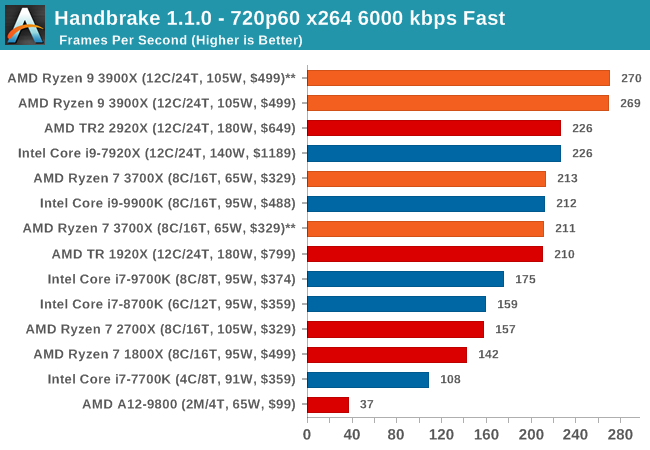
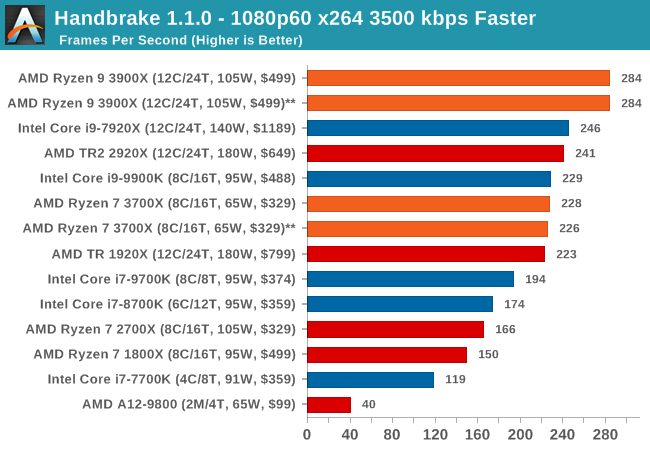
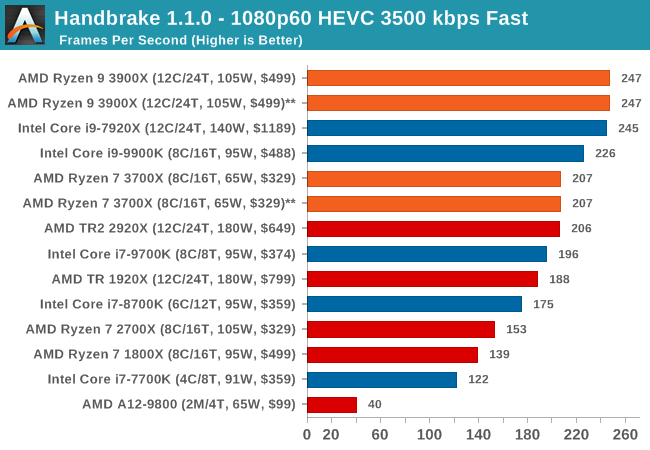
7-zip v1805: Popular Open-Source Encoding Engine
Out of our compression/decompression tool tests, 7-zip is the most requested and comes with a built-in benchmark. For our test suite, we’ve pulled the latest version of the software and we run the benchmark from the command line, reporting the compression, decompression, and a combined score.
It is noted in this benchmark that the latest multi-die processors have very bi-modal performance between compression and decompression, performing well in one and badly in the other. There are also discussions around how the Windows Scheduler is implementing every thread. As we get more results, it will be interesting to see how this plays out.
(Please note, if you plan to share the Compression graph, we'd appreciate it if you could please include the Decompression graph as well. Otherwise you’re only presenting half of the picture)
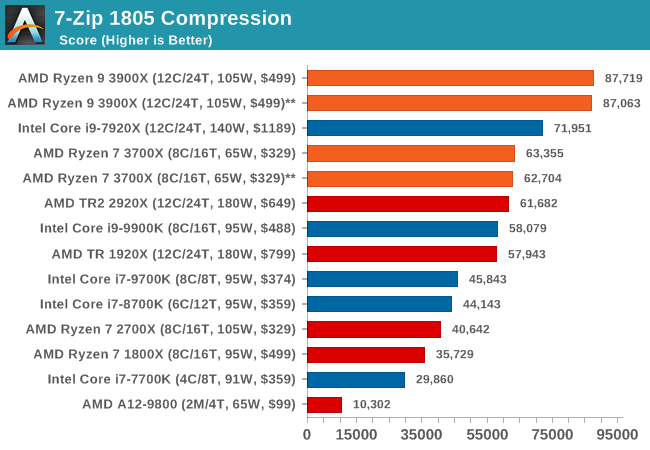
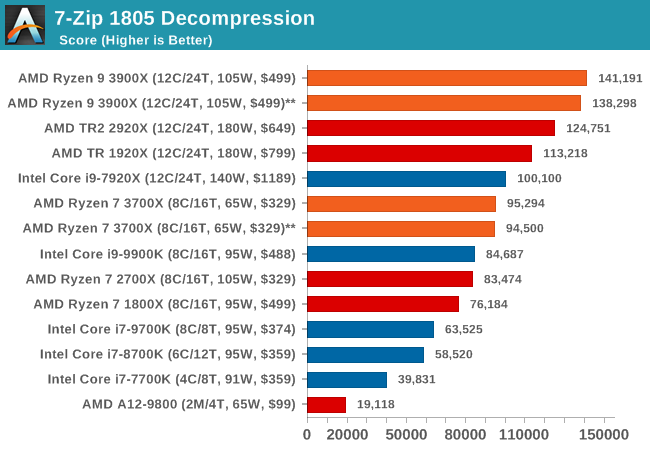
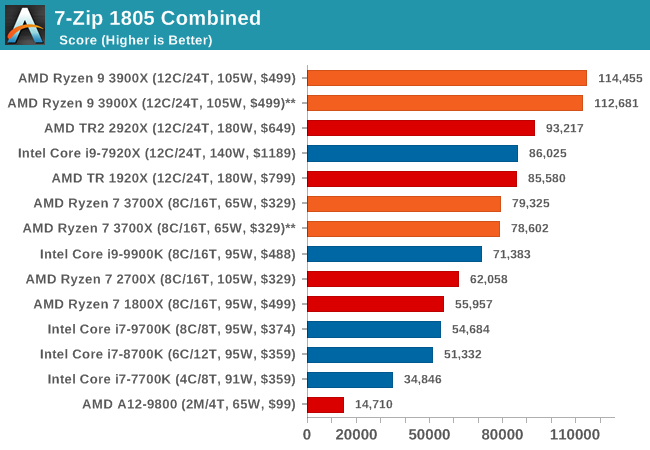
WinRAR 5.60b3: Archiving Tool
My compression tool of choice is often WinRAR, having been one of the first tools a number of my generation used over two decades ago. The interface has not changed much, although the integration with Windows right click commands is always a plus. It has no in-built test, so we run a compression over a set directory containing over thirty 60-second video files and 2000 small web-based files at a normal compression rate.
WinRAR is variable threaded but also susceptible to caching, so in our test we run it 10 times and take the average of the last five, leaving the test purely for raw CPU compute performance.
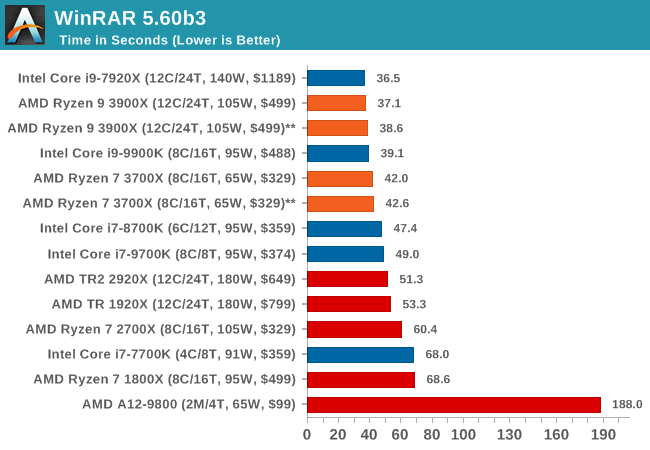
AES Encryption: File Security
A number of platforms, particularly mobile devices, are now offering encryption by default with file systems in order to protect the contents. Windows based devices have these options as well, often applied by BitLocker or third-party software. In our AES encryption test, we used the discontinued TrueCrypt for its built-in benchmark, which tests several encryption algorithms directly in memory.
The data we take for this test is the combined AES encrypt/decrypt performance, measured in gigabytes per second. The software does use AES commands for processors that offer hardware selection, however not AVX-512.
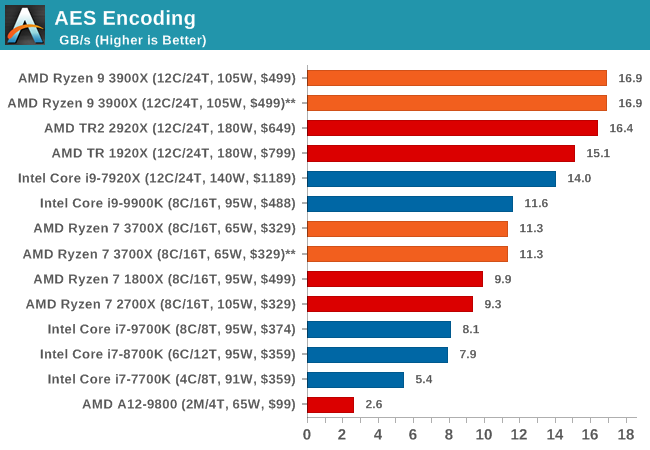










447 Comments
View All Comments
Tkan215 - Monday, July 8, 2019 - link
true the future is more cores. People and customers should feel awake that single core aint the future its just a stopping rock. more cores !Tkan215 - Monday, July 8, 2019 - link
yes i called it a tie because of the margin of error and patches were not taken into account. also, Intel get enormouse game support so really many factors as they are not equal playing groundwatzupken - Sunday, July 7, 2019 - link
Intel's bad moment just started. Clearly while there are some areas where Intel chips are still doing well, however the victories are significantly lesser now. Looking at the power metrics, they lost the fab advantage, so they are now in the disadvantage. To top it off, Intel is still charging monopolistic prices on their existing chips. Have not really seen the rumored price cuts, which may be too little and too late.StrangerGuy - Sunday, July 7, 2019 - link
IMO the $200 CPU landscape is now buy 3600 non-X, or get ripped off by Intel anything even if the latter for cheaper by $50.mikato - Thursday, July 11, 2019 - link
Yeah I really wish a 3600 was tested.Maxiking - Sunday, July 7, 2019 - link
Intel is waiting for 10nm, considering the fact AMD didn't even match Skylake prepatches performance... IF Intel fixes the 10nm, AMD will be be smashed to the ground. If it is a big if, but it is a fact.Mahigan - Sunday, July 7, 2019 - link
AMD actually beat Intel on a clock for clock basis now. What you're seeing is Intel's higher boost clocks saving the day (somewhat).If Intel can't go past 5GHz with their 10nm, due to the new core design, and only are able to get say 10-15% more performance per clock then Gen3 Ryzen will most likely end up, with its 7nm+ and improvements AMD aren't done making, in tough competition.
just4U - Sunday, July 7, 2019 - link
Intel won't be doing any smashing anytime soon there Max.. I was damn pleased with the overall value/performance of my 2700x in comparison to my highly overclocked 8700K (4.9Ghz) and basically shrugged of the 9 series intel. The addition of a 12core.. with great performance levels really changes the game.Even if Intel brings something out it's not going to destroy anything. All we've seen over the past 5 years is small bumps upwards in performance.
Korguz - Sunday, July 7, 2019 - link
Maxiking intel has been waiting for 10nm for 204 years now.. and they are still kind of waiting for it. skylake prepatch ? as in specture and meltdown ? um.. kind of need those fixes/patches in place, even if it means a performance hit.. but by all means.. get skylake, dont fix/patch it, and worry about that.. and spend more.. its up to you... either way.. zen2.. looks very good....Targon - Monday, July 8, 2019 - link
What RAM was used in the Intel system? The Ryzen system used DDR4-3200, but it's CL16, not CL14 RAM. That CAS latency difference would be enough for Ryzen to at least tie the 9900k if not beat it in the gaming tests.